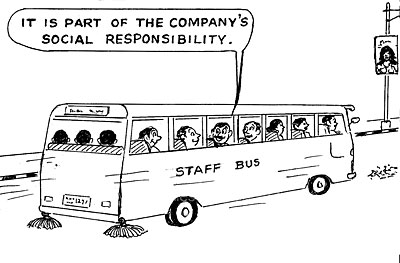 SANKARLALSHANMUGAM.BLOGSPOT.COM |
If a company plans to hide scholarship coupons in its products for few lucky students to find it, and label it CSR initiative, stop. That was never what corporate social responsibility was supposed to be about.
CSR has been misused and abused so much that it is perhaps time to drop the acronym altogether. So-called CSR activities appear to be aimed less at serving the society and more at servicing a company's sales and image. Maintaining a roundabout just so that you can put up your signage on the busiest part of the road is a laudable PPP effort, but don't call it CSR. The very fact that companies hire marketing agencies to design their CSR demonstrates that we have got it all backwards.
CSR is not charity either. Companies give handouts, free blankets to old age homes, free health camps, donations to schools and call it CSR. While every little donation counts, sorry, philanthropy isn't social responsibility.
CSR is a long-term approach for an organisation to be socially responsible in all level of its operations. It can do so by ensuring the rights and benefits of its workers, by being eco-friendly, by implementing sustainable practices in business and also by being financially accountable. CSR is not only for multinationals and large conglomerates, even small companies can have a social conscience.
In fact, CSR should be renamed Sustainable Entrepreneurship, a company culture that doesn't waste resources, promotes workers' welfare and protects the environment. In Nepal we need social entrepreneurs, businessmen who look beyond the immediate profit-motive to the larger good of the country and community in their everyday dealings.
The idea is to balance the interests of all the stakeholders, internal as well as external. CSR needs to start within the company. Providing a healthy and indiscriminate working environment and taking care of the workers' health and education increases their motivation, which then has a positive impact on the company's productivity. Similarly, a company can find ways to decrease and recycle its waste products and make more efficient use of its resources, instead of just conducting an annual tree plantation program. Contrary to what most business men think, CSR is not a cost area but a value-adding tool to the business.
Dabur Nepal, for example, offers employment to local farmers to cultivate endangered plants. It is rightly called a CSR project because it fits strategically with the company's business, and at the same time conserves the herbs and helps the local economy. Ace Bank's support for its mascot rhino's conservation is also a novel approach to CSR.
However, ensuring that companies abide by ethical practices and implement socially responsible practices can be difficult in Nepal where neither the government nor the civil society keeps a check on them. But standards such as Fair Trade Group Nepal and Good Weave (Rugmark) can help implement CSR. These certifications of CSR also provide a better market to the products internationally.



